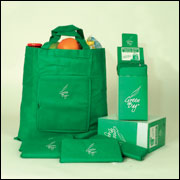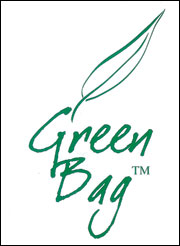 Ireland’s high-profile 2002 introduction of a tax on disposable plastic shopping bags has cut their use there by over 90% and raised millions of Euros in revenue in the process. Since then, the question of how to control disposable plastic shopping bags’ environmental impact, both as litter locally and in the world’s oceans, has been high on the public affairs agenda worldwide, including here in Britain. Concerned UK retailers are increasingly turning for help to The Green Bag Company, a specialist advisory, design and product supplier with global experience, which creatively addresses retailers’ needs and the opportunities related to the issue of disposable shopping bags.
Ireland’s high-profile 2002 introduction of a tax on disposable plastic shopping bags has cut their use there by over 90% and raised millions of Euros in revenue in the process. Since then, the question of how to control disposable plastic shopping bags’ environmental impact, both as litter locally and in the world’s oceans, has been high on the public affairs agenda worldwide, including here in Britain. Concerned UK retailers are increasingly turning for help to The Green Bag Company, a specialist advisory, design and product supplier with global experience, which creatively addresses retailers’ needs and the opportunities related to the issue of disposable shopping bags.
The reusable bag story started in Ireland in 1999, when the looming prospect of the ‘Plastax,’ as it became known, inspired the Green Bag Company founders to developing a sustainable answer to the single use plastic bag. This led to the formation of The Green Bag Company in Australia, which now operates all over the world, including here in Britain. David Lyons, Green Bag’s UK Business Development Manager, spoke to The Grocery Trader.
The Grocery Trader – First of all, David, by way of background, what is the scale of the environmental problem caused by disposable plastic bags?
Research from September 2000 shows UK consumers using around 8 billion carrier bags per year. A typical plastic bag, which is used once or maybe a few times for a few minutes between store and home and then thrown away, takes up to 1,000 years to break down. Plastic bags have been found in the wild and in the oceans from the Polar Regions to the Equator, and 270 different species are known to have suffered, including seabirds, turtles, whales and fish.
GT – What is the position in the UK regarding legislation to reduce the impact of disposable plastic shopping bags?
No communal EU Directives on plastic bags are understood to exist as yet, but the individual UK national Parliaments are considering introducing legislation. In the interim, many larger UK retailers have introduced voluntary codes of practice over their use of disposable plastic shopping bags, even though as yet there’s no legal obligation to take action.
GT – How does this compare with the situation in other countries?
Individual countries’ response varies considerably. Ireland has led the way and has reduced consumption by 90% since the 2002 tax; California is at the initial stage and has introduced preliminary legislation; whilst other countries such as South Africa, Mauritius and parts of India have followed suit with a variety of measures.
GT – Can you sum up what Green Bag does?
In addition to our highly successful range of Green Bag products, we also provide a comprehensive design service from concept to finished items, as a tailored response to individual company or business requirements.
GT – Which countries do you currently trade in?
The Green Bag Company is currently trading in Ireland, the UK, Germany, Switzerland, Italy, Japan, Australasia and the US.
Our major customers in Australia include Australian Post, Masterfoods Australia, ANZ Bank and the IGA retail group; in the US, we serve Publix retail chain, WholeFoods Markets and Target store groups; and provide bags for Hilton Group.
GT – What are your current sales in these markets?
This year we expect to sell 30m bags globally, amongst our regional markets.
GT – What about UK customers?
We’re starting to make serious inroads here. We’ve been working on pilot exercises with various major UK retailers and charities and are now targeting the mid range to larger supermarket chains, health food specialists and everyone in retail with ‘green’ minded consumers who take the concept of long-life bags seriously.
 GT – How do consumers use re-usable bags in their daily lives?
GT – How do consumers use re-usable bags in their daily lives?
Re-usable bags are in their infancy in the UK, and it will take time to get people used to them. In Ireland, where the reusable bag concept has been around for six years, you’ll find several branded reusable bags in every household, and see them in cars’ back windows. Irish households took to these bags immediately, and there’s no reason why it shouldn’t happen here in time, with retailers’ support. If anything, UK households should be even more receptive to the idea, given their involvement in green issues.
GT – How do you develop a Green Bag solution for a particular retailer?
We start by ascertaining their interest and assessing how best to tailor our proposition to their requirements. We then submit samples, agree the weight of material, colour and other variables with the client and deliver the order.
GT – What is your (David) role in the business? Who else is involved in servicing the UK market?
As Business Development Manager I’m responsible for building our new relationships here, and work alongside Peter Maguire, our Head of Sales for the UK and Ireland, and Mark Tan, who runs the London office. I also work closely with our design team and our delivery logistic support team.
GT – The UK supermarkets’ scale of operations is gigantic. What capacity do you have to help them?
We’re well placed to meet the big supermarkets’ requirements, and fulfill our European orders from our five factories in China, monitored through our QA team. We have an open door policy and will happily show retailers around our factories. We’ve been audited by our major retail customers and have our own QA procedures, which we are updating to ensure even tighter levels of quality assurance.
 We currently have orders in hand for 4 million bags. We work hard to meet customers’ lead times and delivery schedules: we’ll be happy to quote for bags to any UK retailers, and for those already using NWPP bags from other suppliers, we’re confident we can match their existing suppliers on price and quality. We have direct control over our factories in China, unlike most other suppliers, who buy their bags through local agents.
We currently have orders in hand for 4 million bags. We work hard to meet customers’ lead times and delivery schedules: we’ll be happy to quote for bags to any UK retailers, and for those already using NWPP bags from other suppliers, we’re confident we can match their existing suppliers on price and quality. We have direct control over our factories in China, unlike most other suppliers, who buy their bags through local agents.
GT – How long does it take to develop a solution for a customer and turn round an order?
Once we know their requirements and have a rapport, we can produce a quotation in 48 hours. After the samples and design are agreed, we can deliver an order in eight to ten weeks.
GT – What different bags are you offering in the Green Bag range?
The Green Bag Company offer a specialist advisory role with both design and production of a tailored bag product. As such, we will gladly work with clients to develop a product that best suits their needs to whatever specification they require. Our generic bag range can be reproduced using any client’s logo and displays our “Green Bag” label, and is often supplied in a zip-up bag, a fold-up bag, wine bag and a cooler bag. They are all on offer in the UK.
GT – Which of your bags are suitable for the weekly shopping trip? How does these bags’ capacity compare with plastic bags?
Our standard bag is ideal for the weekly shop and holds the equivalent in shopping of 3-4 normal shopping bags.
GT – What is the price of your bags to the shopper?
Depending on the retailer’s economies of scale and pricing policy, retailers can re-sell Green Bags for somewhere between £1- £2.50.
GT – What materials are your bags made from?
Our bags are made from Non Woven Polypropylene (NWPP). The base is reinforced ‘PE’ (Poly Eurethyne), made from 100% recycled material.
GT – Are your bags water-repellent?
Yes, the NWPP and PE elements are both waterproof and water-repellent.
 GT – What weight can Green Bags hold?
GT – What weight can Green Bags hold?
Green Bags will hold anything you can find in a grocery store: the limiting factor is the strength of the shopper’s arm to lift them!
GT – Can you wash them? How long does each bag last?
You can wash them, and there are no toxic colours. Used regularly, Green Bags should last three or four years.
GT – Why use NWPP to make Green Bags rather than cotton, jute and so on, which are renewable?
Jute is a natural fibre and a sustainable resource, but it’s relatively costly. We decided to concentrate on NWPP so we can offer retailers economies of scale, and make it affordable for consumers to switch to Green Bags. Whilst a variant of materials were tried in Ireland before and since the advent of the plastax in 2002 – NWPP products have been the firm leader in market choice in this area.
GT – How do Green Bags perform compared to jute etc?
Spillage and moisture are easily taken care of with NWPP, with no odour remaining, unlike jute, cotton and canvas bags, which must be washed thoroughly. Cotton, jute and canvas bags ‘sweat’ through a combination of holding moisture and retaining dampness, which is conducive to microbial growth when warm food is put in.
Cotton and calico bags do not have the durability of a NWPP bag and aren’t sturdy enough to stand upright whilst checkout packing occurs. NWPP bags can stand upright, and be packed in a similar style to a cardboard box. In terms of price, canvas and jute bags currently retail at somewhere between £4 and £10 each bag. This means consumers are less likely to purchase four or five canvas bags to meet their shopping needs compared to NWPP bags, for which average purchase is four to six bags per household.
The branding opportunities are less prominent on cotton and jute bags than NWPP. Cotton and jute don’t hold inks well: NWPP increases brand exposure by maintaining a strong, robust print.
GT – Single-use disposable bags cost money to give away. What savings does offering your bags give the retailer?
In Ireland, it costs a customer 22c (15p) for a single use plastic bag, something that a retailer must provide for little to zero profit, which of course affects the retailer’s bottom line. Green Bags cost the retailer money to buy, but they make a significant margin when they sell them on.
 GT – Do you work with local governments and communities in any countries where you sell Green Bags to address the environmental problems caused by disposable plastic bags?
GT – Do you work with local governments and communities in any countries where you sell Green Bags to address the environmental problems caused by disposable plastic bags?
We are talking to the UK media and grocery retailers, amongst others. We also work with schools in the US on education about plastic bags. We hold fundraising days, and could do something similar here. We’re talking to the UK media and grocery manufacturers about linking up with them on joint promotions to capitalise on the feel-good aspects of green bags, and are also consulting at local government level, taking the successful Irish experience as the starting point.
GT – Have you received any recognition or awards for your work?
We’ve received much recognition and some handsome testimonials.
GT – What do you see as the biggest external factors that are likely to affect demand from retailers and consumers for your bags?
You’d have thought the threat of impending legislation would be the biggest driver, but it’s in fact been the retailers and their customers that are actually driving it. The other factor is interest from the major supermarkets and retailers, who understand how their bottom line can be positively affected.
GT – Finally, where do you see Green Bag as a business going in the UK?
We have a tightly knit team that is focused on the UK for the time being, and once we become more established here we’ll widen our focus to France, Spain and Portugal and other countries. It’s very early, but we hope in the next 12 months to gain a significant market share and become a recognized brand in the region, as we are in the US and Australia.
Green Bag Company
Tel: 0207 916 9477
Email: dlyons@greenbag.info
Email: pmaguire@greenbag.info
www.greenbag.info




1 Comment
Dear sir/madam
We are the manufacturer & exporters of bags & accessories.We want to establishing business relationship with your organization and want to be a trustful supplier of your company.For more detail about us and our products,please visit our homepage.We are in this line from last 25 years and have good experience and craftsmanship.Thanks